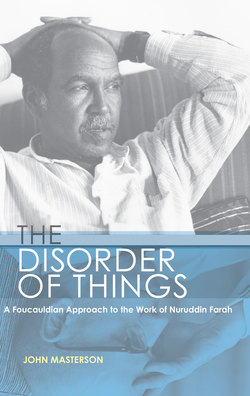Читать книгу The Disorder of Things - John Masterson - Страница 7
На сайте Литреса книга снята с продажи.
1 Taking On Foucault and Fleshing Out Farah: Opportunities for Dialogue and Reflections on Method
ОглавлениеFor myself, I prefer to utilise the writers I like. The only valid tribute to thought such as Nietzsche’s is precisely to use it, to deform it, to make it groan and protest.
(Michel Foucault – ‘Prison Talk’, 1980: 53–54)
I wrote The Offering for the University of Essex, for my M.A. thesis ... on the day I was to submit it I had a conflict, an open, theatrical clash with one of my lecturers, and I used bad language, or she used bad language. And then I walked out and never went back to collect the degree.
(Nuruddin Farah – ‘How Can We Talk of Democracy?’, 2002a: 40)
University libraries are like madhouses, full of people pursuing wraiths, hunches, obsessions. The person with whom you spend most of your time is the person you’re writing about. Some people write about schools, groups of artists, historical trends or political tendencies ... but usually one central figure emerges.
(Patricia Duncker – Hallucinating Foucault, 1997: 4–5)
ON RARE OCCASIONS, YOU STUMBLE ACROSS A TEXT THAT MAKES YOU smile and wince at the same time. Such was my experience with Patricia Duncker’s debut novel. Her anonymous student protagonist obsesses over and finally locates errant author Paul Michel in a provincial French asylum. He subsequently helps him escape, sleeps with him and, various twists of fate later, attends his funeral. Beyond its intrigues of plot and character, Duncker’s novel succeeds in representing the problematic, because human, aspect of research. Before his meeting with Paul Michel, her protagonist has only a tepid passion for academic investigation. It is only when researcher and researched collide that he feels his work truly begins to ‘mean’ anything. When the scholar uncovers previously confidential correspondence between his author and namesake Michel Foucault, the analogy between university library and madhouse appears even starker: ‘Paul Michel was a novelist and Foucault was a philosopher, but there were uncanny links between them’ (Duncker 1997: 6). In the final reckoning, Paul Michel explains how the young scholar might achieve a healthier balance in life, within the university and beyond: ‘I make the same demands of people and fictional texts, petit – that they should be open-ended, carry within them the possibility of being and of changing whoever it is they encounter’ (Duncker 1997: 111).
In my case, the truth has not been quite as strange as fiction. The long shadow cast by Foucault throughout Duncker’s novel has, however, had a similarly profound effect on my writing and thinking. Without much by way of gentle introduction, the first lecture I attended as an undergraduate at the University of Essex began with a reading of the striking description that opens Discipline and Punish. Forced to imagine Damiens’ dismembered body, as I also struggled to deal with novice nerves, induced a queasiness I took to be synonymous with university life. Whilst I cannot recall the rest of the lecture, this graphic depiction had a marked impact. Years later, and in a different academic setting, a similar feeling set in after reading visceral descriptions of menstruation, as well as sexual and political violence in Nuruddin Farah’s Maps. From this experience, an interest in forging the ‘uncanny links’ identified by Duncker’s narrator was born. I began hallucinating Foucault once more and, on discovering the Somali author had spent a period as a graduate student at my old institution, an eerie inevitability began to charge the dialogic impulse behind this book. With a view to pushing beyond the personal, however, this introduction indicates how I intend to avoid the maddening pitfalls of Duncker’s imagined reader.
Whilst the remainder of this chapter provides a discursive foundation for the study as a whole, particularly in terms of why I believe Foucault’s work offers an enabling lens through which to view Farah’s, I begin by introducing the Somali writer. This also allows me to establish what this book is not. In no sense is The Disorder of Things a literary biography. Whilst Farah is a subject worthy of such an endeavour, I make no claims to it here. In establishing a platform for what follows, however, I suggest that the peculiarities of Farah’s own narrative, particularly the manner in which he has negotiated his own exile from Somalia as well as a series of transnational wanderings, necessarily informs his oeuvre.
